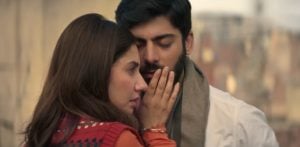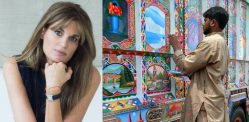"The way we dress forms a big part of who we are."
In a world where diversity and love intertwine, the story of Sarah and Saqib unfolds as a unique journey leading to their wedding day.
Their bond has led them down a path less travelled, culminating in a wedding celebration reminiscent of the nuptials of Imran Khan and Jemima Goldsmith.
Originating from distinct backgrounds, Sarah, a Brit hailing from Westminster London, and Saqib (Saq), with his Pakistani heritage, defied societal norms and forged a love story that celebrates both their cultural heritages.
Their decision to base their wedding look on Imran and Jemima was not just a tribute to their image but a testament to the power of love in the face of challenges.
As we delve into their journey, Sarah and Saq share their perspectives on navigating cultural contrasts, and the impact of their admiration for Imran and Jemima’s journey on their approach to marriage.
Their story serves as a beacon of hope for couples facing similar hurdles, emphasising the importance of authenticity and an unwavering belief in the strength of love.
Can you tell us more about the inspiration behind your wedding day?
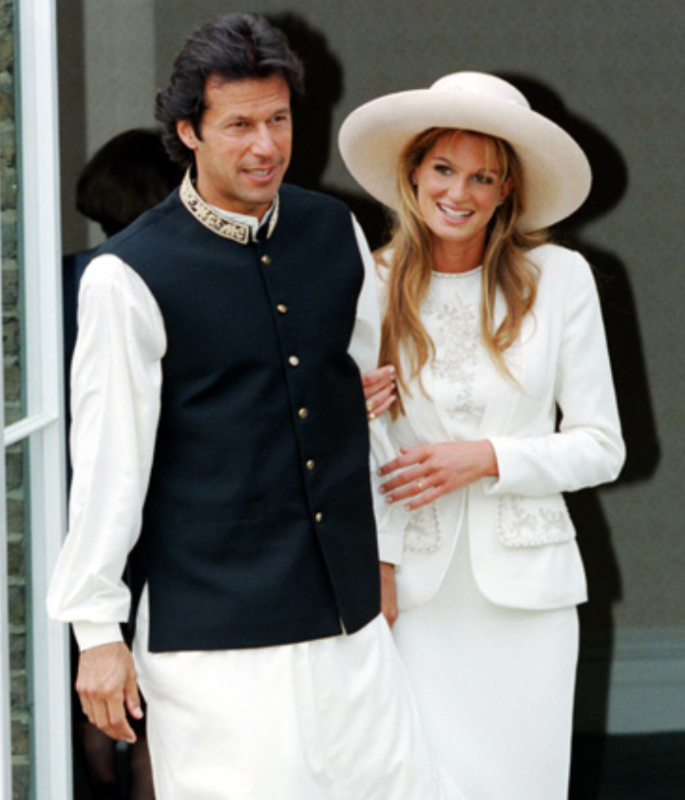 Basing our wedding look on that of Imran and Jemima came quite naturally, mainly from the fact that we share some similarities to the couple in terms of our image and backgrounds.
Basing our wedding look on that of Imran and Jemima came quite naturally, mainly from the fact that we share some similarities to the couple in terms of our image and backgrounds.
The resemblance to the couple has been pointed out by our friends who called us the ‘Imran and Jemima’ of the group. It seems that opposites do attract!
Saq and I have been familiar with Imran and Jemima’s relationship history and Jemima has been a role model for me for quite some time, which is where the inspiration also sparked.
Imran and Jemima are not just an iconic former couple, but also to be admired for the challenges they have fought through, whilst achieving a great deal in their personal and professional lives.
It must not have been easy to do so whilst in the public eye and with ongoing stories and criticism circulating.
When I put forward the idea of recreating their iconic wedding look, Saq was immediately on board.
He had his waistcoat specially made by a tailor, which was only ready to collect just two days before we flew out!
Can you share more about the significance of having a Nikah and a British legal wedding?
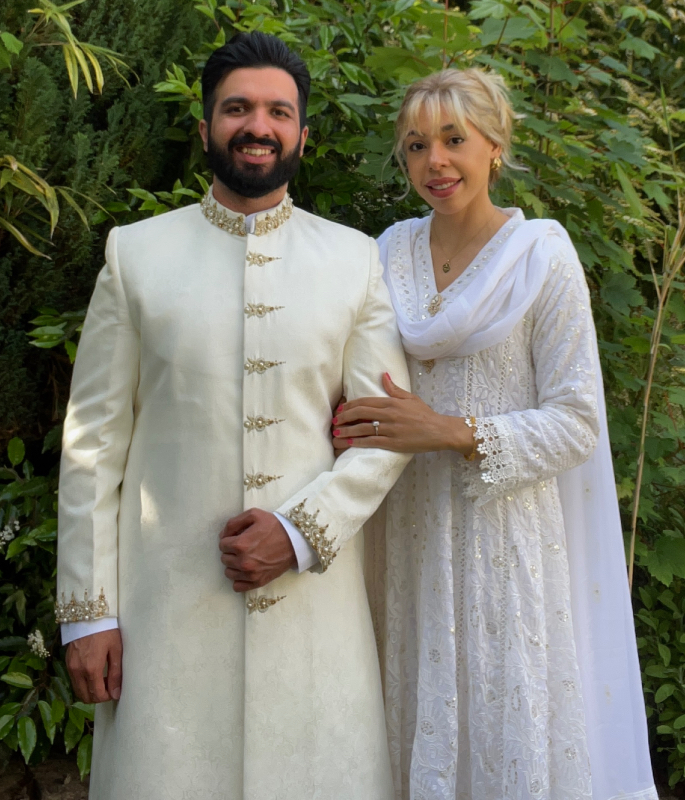 Though Saq and I have always shared the same values surrounding marriage, the way in which this occurs in each of our cultural backgrounds is vastly different.
Though Saq and I have always shared the same values surrounding marriage, the way in which this occurs in each of our cultural backgrounds is vastly different.
It was important that we had both ceremonies as a sign of respect for and acceptance of each other.
The Nikah is the ultimate sign of love and marks the true beginning of a couple’s journey together.
The significance this held for Saq, who is Muslim, naturally made it special to me too.
Being British and non-Muslim myself meant it was also important to include my own input by way of the British legal ceremony, where we promised to love, respect and support each other in our vows that we had written ourselves.
We chose Mustique for a number of reasons, one being that Saq and I are both keen travellers.
Before we met, we had both spent many incredible months travelling through Southeast Asia.
Since then, we have continued our travels with each other, the most memorable (aside from Mustique) being Mauritius, where Saq proposed.
Mustique is known for its beauty, privacy and uniqueness, qualities that are reflective of the type of ceremony we were seeking.
I am also fascinated by the history of Mustique and its notable visitors, one being the late Diana, Princess of Wales, who coincidentally was a close friend of Jemima.
Furthermore, to reach Mustique, the usual route is to take an international flight to either St. Lucia or Barbados, followed by the twin otter plane charter to the island.
So choosing Mustique also fitted in nicely with planning two pre-wedding boys’ and girls’ trips, which were dubbed ‘Boys to Barbados’ and ‘Sistas to St. Lucia.’
In addition to the location, the date of our wedding of 26th June also held significance, being my late Grandfather’s birthday, who was a huge role model to my family and me as a child.
How did it feel to have your Nikah at your Cheshire home?
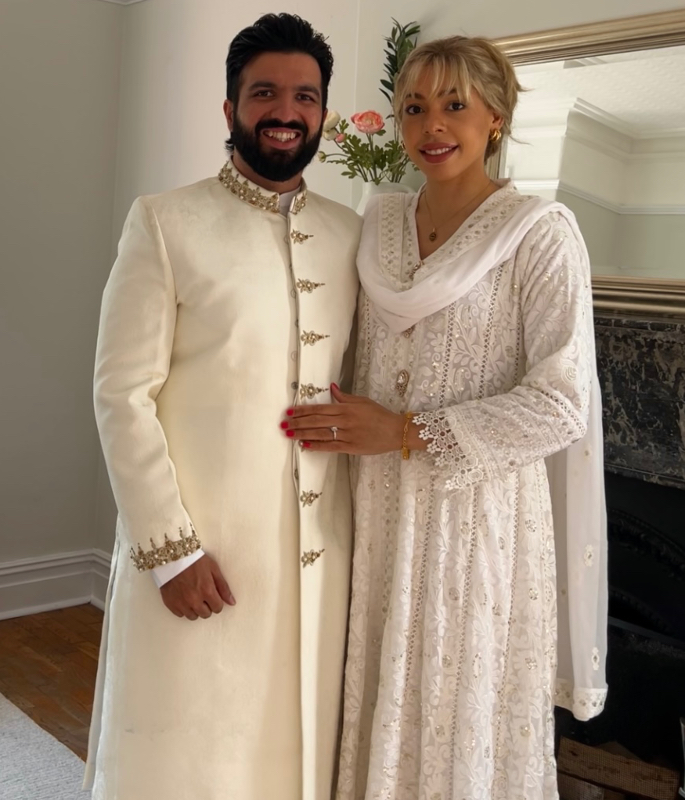 The Nikah was very low-key but special, and having it in our own home made it even more so.
The Nikah was very low-key but special, and having it in our own home made it even more so.
I was happy for it to be held in a mosque, however, it just sort of happened last minute that we both liked the idea of home.
We had just recently moved house and so it became an opportunity to bless our new home and future together.
The idea behind it was also that it would feel more personal and informal and allow us to really take everything in on the day.
With the ceremony being so small too, it just made sense.
Saq’s mum and two brothers were witnesses and the weather was perfect!
Can you share how you introduced each other to your respective families?
 At the time it was quite confusing. Looking back now, I don’t think I realised how much coming from such different backgrounds played a part in our relationship.
At the time it was quite confusing. Looking back now, I don’t think I realised how much coming from such different backgrounds played a part in our relationship.
To my friends, Saq was British, but in our relationship, it felt like there was an extra layer.
In Pakistan, a Muslim-majority country, there is no widely accepted concept of dating or ‘boyfriend’ and ‘girlfriend.’
The law says that a man and woman should have the ‘Nikah’ (marriage) before being in contact with one another.
So romantic interests generally progress only after the ‘proposal’ and marriage which usually takes place a few weeks or months later.
So, of course, we felt a lot of pressure over the years of being ‘together.’
However, the time that Saq and I gave ourselves not just for our relationship, but also to grow as individuals was invaluable.
If we could go back in time, I don’t think either of us would change anything.
When the time did finally come around, I met Saq’s family at his niece Saira’s birthday dinner, and he met mine at home in Buckinghamshire.
They were during the same summer and both were a success (we think!).
We managed the aforementioned aspect mainly through trust, where we could be honest with each other about how we felt and ultimately by being each other’s cheerleader for all those years.
Saq has always been, without a doubt, my soulmate. However, our compatibility as life partners seemed more challenging!
We are polar opposites in many ways, not just in our cultural backgrounds, so that was also interesting for us both to navigate.
In the end, our love and acceptance of each other are what led us to our two special days.
What advice would you give to other couples who might be going through similar cultural or relationship differences?
 My advice to other couples would be to trust their instincts and not let societal standards or pressures define or influence their relationship.
My advice to other couples would be to trust their instincts and not let societal standards or pressures define or influence their relationship.
I think that is especially important in the current social media climate, where there are constant messages and images of what a ‘normal’ relationship should look like.
I recently watched the British romantic comedy film written by Jemima Goldsmith, What’s Love Got To Do With It? and could relate to many of the scenes, in both funny but also genuine and emotive ways.
I wish the film had come out years ago, as it would have given me some reassurance in the past.
On the topic of arranged marriages, the film resurfaced a particular old memory of Saq telling me of romantic prospects being put forward to him (to which he politely declined, I think!).
It was a conversation I had never come across and not something myself or my friends could relate to.
I think at the time all I really needed was the advice I am giving out now.
I would also say to stay true to who you are. Though we can make some changes out of respect for another person, there should not be a need to conform.
I recently got back from the Netherlands where I modelled for a beautiful Dutch brand, a country where like the UK, the dress code is hugely different to Islamic communities.
The way we dress forms a big part of who we are, our interactions and our daily life.
I do tend to dress modestly by nature and am not open to jobs for overtly revealing or distasteful collections.
However, even a lot of modest European clothing does not fit the Islamic dress code, and it would be unfair to reject my authentic self as well as remove my creative outlet.
Whilst there is a lot I can learn from Muslim couples, I feel like together Saq and I have the ability to see things from both points of view in a way that possibly some all Muslim couples don’t.
So, it is also important to see the positive that comes with differences.
How has your shared admiration for Imran and Jemima’s journey influenced your approach to relationships?
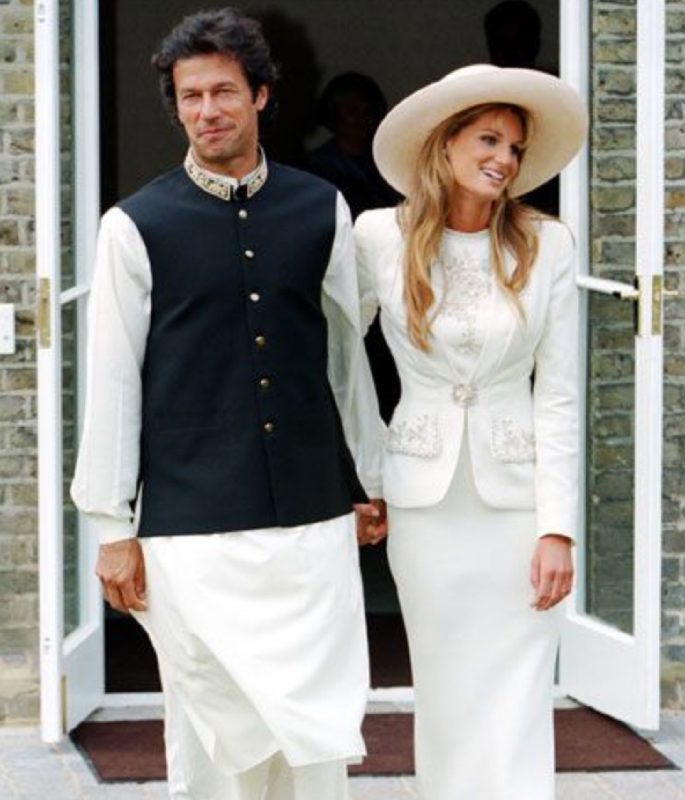 The biggest lesson that Imran and Jemima’s journey has given us is perspective.
The biggest lesson that Imran and Jemima’s journey has given us is perspective.
Which in turn has shaped our approach to our relationship and marriage.
Imran and Jemima’s journey makes our own challenges seem relatively small in comparison.
The protests outside Jemima’s house, targeting of her children, anti-Semitic abuse, the hijacking of the plane that Jemima and her children were on, the political arrests and assassination attempts of Imran, and his involvement in an ongoing political crisis, are just a few examples.
These stories not only provide us with perspective but also remind us of what past generations have tolerated in the journey towards change and progression.
My approach to our relationship and marriage is to keep the bigger picture in mind.
Whilst we may have our debates and challenges, I try to remind myself to reflect on their size and not give them too much weight.
Is there a particular moment of your wedding day that stands out as the most meaningful to both of you?
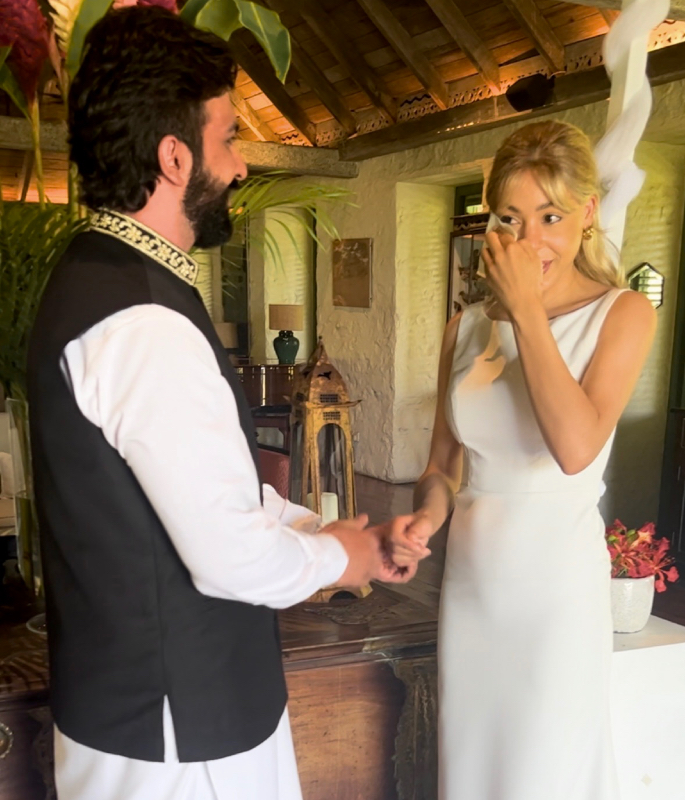 There are many moments that stood out to us both, and saying our vows that we had each written in Mustique was definitely one of them.
There are many moments that stood out to us both, and saying our vows that we had each written in Mustique was definitely one of them.
I could not help but have a tearful moment during the vows, as love and emotions got the best of me.
We also have a recording, which was nice to be able to listen back to. Saq went first, where he said:
“From that winter when I first saw you at the interview, I called my best friend Tim after and I said you’re going to be my wife.
“And since that day, we’ve had our ups, we’ve had our downs. We’ve seen the good, we’ve seen the bad.
“We have seen everything throughout, and the man I am today is down to the vision you had, the motivation that you give me, the push that I get from you and I just wish that I could give back half as much as you give me going forward and for the rest of our life, even after life.
“That’s coming from the bottom of my heart.”
Then when it was my turn, I said: “When I met you all those years ago, I did not think that a perfect soulmate could be my life partner forever.
“But now I realise that perfection does exist. And not in the way of perfect pictures or imagery, but perfect in the sense that you accepted me for who I am, from the beginning, and I can just be myself around you.
“And I want to thank you for that. There is nobody else I would rather spend the rest of my life with.
“I can’t wait for our future together, and I promise to support you, and us, and hopefully us as a family too.”
Now that you are married, what are your aspirations for the future as a couple?
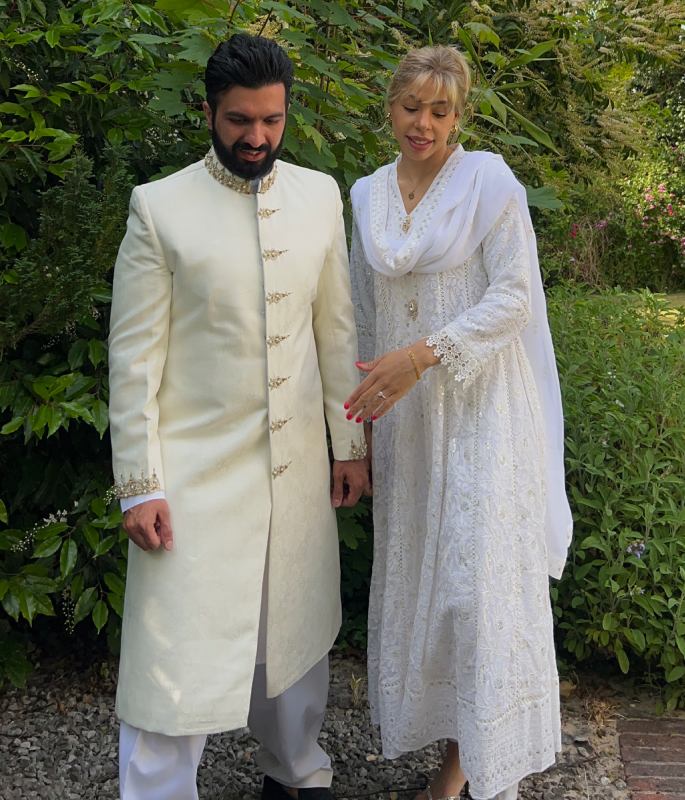 We are both looking forward to the future with an open mind.
We are both looking forward to the future with an open mind.
I can’t picture where we will be in five years’ time, or whether we will still be living in the UK, as we both have our eyes on a few countries.
I would love to live in Bali but Saq is scared of snakes and I’m not sure he would take to the natural Zen lifestyle like I would.
One of his favourite countries is Singapore (which I like to remind him is just a short flight to Bali!).
However, since moving from London to Cheshire, we have settled in really well and are building a new life here, so who knows, I might be on The Real Housewives of Cheshire by then!
We would both like children, though I have always wanted to be an older mum, so we haven’t been in a rush.
By ‘older’ I mean in my thirties, which is late compared to countries like Pakistan, where the average age of a woman having her first child is around 22.
We have already discussed baby names though, which seems to have opened up another debate.
Saq would like all the children to have Muslim names, whereas I would like a compromise, perhaps where the girls have English or ambiguous names and the boys have Muslim names.
Maybe we should have a part two interview and I can let you know how that goes!
In a world where differences often divide, Sarah and Saq’s love story shines as an example of love’s ability to bridge cultural gaps and defy societal norms.
From their initial meeting to their heartfelt wedding celebrations, their journey underscores the importance of staying true to oneself while respecting each other’s backgrounds.
As they move forward, their story reminds us that love can bring people together, offering hope to couples navigating their unique paths.
Sarah and Saq’s love is a beacon of light in a complex world, reminding us that, above all, love knows no bounds.












